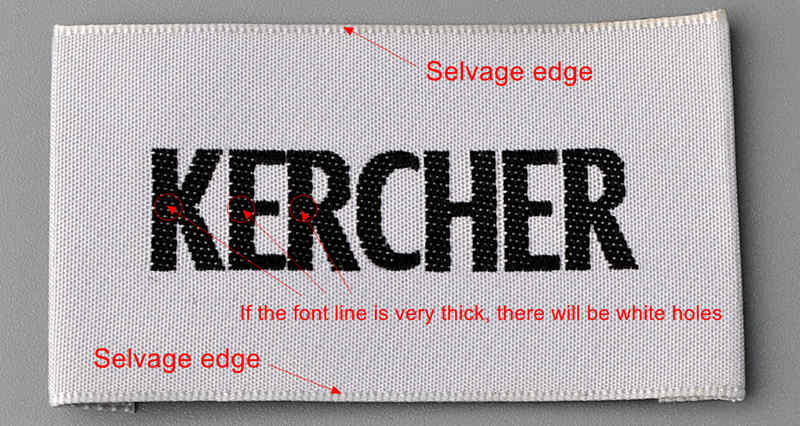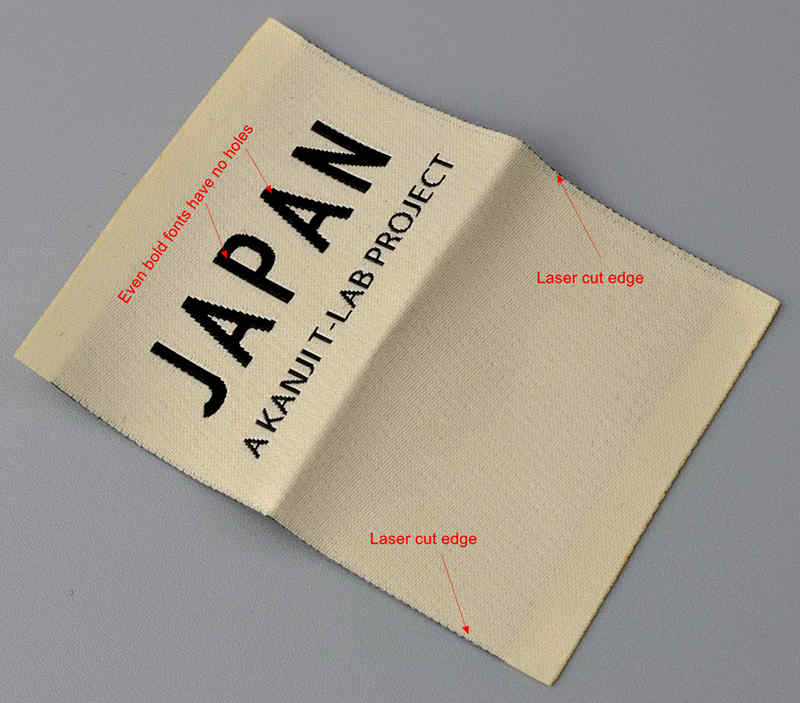The difference between the damask woven label and selvage woven label lies in the production machine, and they belong to the category of fabric woven labels. As we all know, different classifications have different production characteristics. Therefore, distinguishing different labels can help customers understand products more deeply and comprehensively.
What is the damask woven label and selvage woven label?
The selvage woven label
It is a kind of selvage cloth label. When the required trademark is woven at once according to the needs of the width, it is called a selvage trademark. This process avoids many shortcomings of trimming. The output is low and the production time is long, but the effect is good. It can also be divided into a flat surface and satin surface, which is characterized by a complete trademark woven from the machine. Its edge is binding, and the yarn is the same color from the beginning to the end and connected together, so it feels very soft.

The disadvantage is that the production efficiency is low and the number of colors that can be used is generally not more than four. It is suitable for high-end clothing products, such as fashion, suits, and so on. The selvage woven label is generally used as satin marks, but the background color of satin is difficult to express. So, hot stamping and dyeing are commonly used to solve this problem.
Features of the selvage woven label:
- Selvage edge;
- If the font line is thick, there will be white holes;
- Long production time with low output;
- firm and smooth;
- Generally, up to 3 colors and the background color is generally white or black;
- The logo is sparse and has many small holes, which can be made of metallic color (gold/silver);
- High quality, and higher prices than the damask woven label.
The damask woven label
The damask woven label is made on a high-speed machine, which weaves the mark like a cloth, and then cuts it into strips according to the width of the mark. In the process of production, due to the heat-melting property of polyester, the yarn is fused together at the high temperature of 200 ° c of the hot-melt wire and the hot-melt segment. So that the edges will not be scattered. Also because of this reason, appearance and feel will be affected to some extent with insufficient technology.

But a machine with good technical quality, such as an ultrasonic cutter, will be relatively mature and much more perfect than a common electric knife. In terms of color expression, there are no more than 5 colors of the selvage woven label, while a damask woven label can weave nearly 12 different colors.
Features of the damask woven label:
- Flexible processing, high production efficiency and fast production time;
- The material is soft and the price is slightly lower;
- Very rich colors;
- The logo is tight. Even bold fonts have no holes.
- Laser-cut edge.
- Mostly used for common wash label, origin label, size label (low cost), main label, and side label.
What’s the difference?
The mode of production
The selvage woven label is to weave out the required trademark at once according to the width. This process avoids many disadvantages of trimmings, but its output is low. It is characterized by a soft and firm feel. Generally, the color on the label should not exceed four kinds. And it has texture and rich patterns. But it is slow to ship and not in line with the current fast and short production pace. At the same time, it is stiff and the sense of contact with the skin is not good. Like cut-edge woven labels, it also has a flat/satin finish. Generally, it is made of the satin label, but the satin background color is difficult to express, so ironing/dyeing and other processes are often used to solve this problem.

The damask woven label is woven on a special high-speed machine, like a piece of cloth, and then cut into strips according to the width of the label. Because of the heating and melting characteristics of polyester, the yarns will stick to each other when cut, and the edges will not disperse. The burning edge hand of it is a bit hard, and the appearance and feel will be affected to a certain extent. But its output is high, and it can be made up to 12 colors, which can express rich pattern effects.

Woven edge and the color number
- Woven edge: the woven edge with fine texture is the selvage woven label. After processing, the edge of the damask woven label will be different from the former.
- Color category: That with more than 5 colors is generally the damask woven label.
- Another way to discern is to look at the reverse side of the woven label. That with a “little tails” (fold at the tails) is usually the selvage woven label.